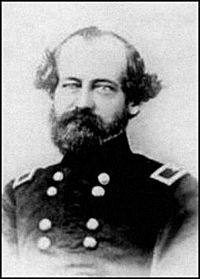Lewis Golding Arnold facts for kids
Quick facts for kids
Lewis Golding Arnold
|
|
|---|---|

Brig. Gen. Lewis G. Arnold
|
|
| Born | January 15, 1817 Perth Amboy, New Jersey |
| Died | September 22, 1871 (aged 54) Boston |
| Place of burial | |
| Allegiance | Union |
| Service/ |
Union Army |
| Years of service | 1837–1864 |
| Rank | |
| Unit | 2nd U.S. Artillery 1st U.S. Artillery |
| Commands held | New Orleans Garrison |
| Battles/wars | |
Lewis Golding Arnold (born January 15, 1817 – died September 22, 1871) was an officer in the U.S. Army. He became a brigadier general in the Union Army during the American Civil War. He is best known for his important work in Florida.
Early Life and Military Training
Lewis G. Arnold was born in Perth Amboy, New Jersey. He went to the U.S. Military Academy at West Point, which is a famous school for training army officers. He graduated in 1837 and was one of the top students in his class.
After West Point, Arnold joined the army. He fought in the Second Seminole War, which was a conflict with the Seminole people in Florida. He also served in the Mexican–American War. During this war, he was badly hurt in a battle called Churubusco. After these wars, he went back to Florida. He led a group of soldiers against the Seminole people in 1856 during the Battle of Big Cypress.
Service During the Civil War
When the American Civil War began, Lewis G. Arnold was promoted to Major. In January 1861, he was sent to Fort Jefferson in Dry Tortugas, Florida. This fort was very important for the Union side.
In October 1861, Confederate soldiers attacked Santa Rosa Island. General Arnold helped push them back. He bravely refused to give up the fort, even when the Confederates attacked it with cannons three times. He stayed at Fort Jefferson until May 1862. His actions were very important in keeping the fort under Union control throughout the war.
In January 1862, he was promoted to brigadier general. Later that year, in October 1862, he was put in charge of the city of New Orleans. The Union forces had recently taken control of the city.
Sadly, on November 10, 1862, General Arnold had a stroke while inspecting his troops. A stroke is a serious medical event that can affect the brain. He had to take a long break from the army while doctors hoped he would get better. But it became clear that he would not fully recover. Because of this, he retired from the Army in February 1864.
General Arnold passed away eight years later, in 1871, in Boston, Massachusetts. He is buried in St. Mary's Episcopal Church Cemetery in Newton Lower Falls.

